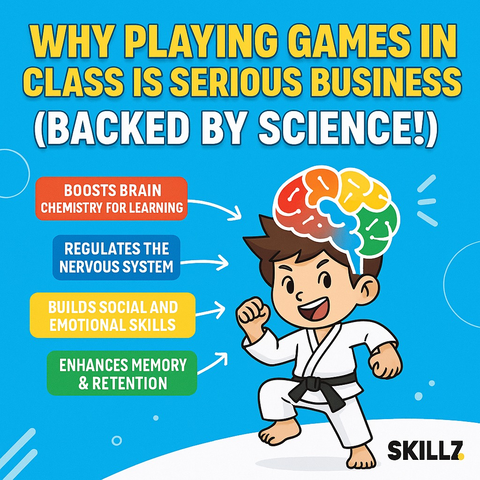Building Leadership in Kids: Without Pressure or Perfection

Every parent wants their child to grow into a confident, capable leader…
But here’s the thing: leadership isn’t something kids just “have” or don’t—it’s something they grow into.
And sometimes, when we try too hard to teach it, we accidentally put pressure on them to be perfect, instead of encouraging progress.
The Problem: Kids Are Overstimulated… But Under-Coached
In a world where kids are constantly being told what to do but rarely how to grow, it’s easy to see why leadership can feel intimidating for them. Some kids shrink back in group settings. Others don’t know how to handle failure, take initiative, or speak up when it matters.
Parents often ask:
“How can I help my child be more confident?”
“What do I do if my child avoids responsibility?”
“How do I raise a leader without overwhelming them?”
The Real Answer? Put Them in the Right Environment
Kids don’t need pressure to lead, they need space to practice leading.
That’s why environments like martial arts-based camp...
Summer Brain Gains at Xtreme Ninja

How Martial Arts Keeps Kids Sharp, Strong, and Smiling All Summer Long
When summer hits, there’s one big question on many parents’ minds:
“Will my child lose momentum while school’s out?”
The short answer? Yes — unless we do something about it.
It’s called the Summer Slide — a real and well-documented dip in academic and social development that happens during long school breaks. Kids can lose months of progress, not just in reading and math, but in confidence, focus, and emotional regulation too.
But here at Xtreme Ninja, we believe summer shouldn’t slow kids down. It should launch them forward.
That’s why our martial arts programs are designed with science, movement, and fun to help students grow stronger mentally, physically, and emotionally — even when school’s out.
Let’s break down how we fight the summer slide with purpose-built training for real growth:
1. We Fuel Brain Chemistry that Supports Learning
Every time your child trains at Xtreme Ninja, their brain get...
Why Martial Arts Classes End with a Game (and Why It’s Backed by Brain Science)

If you’ve ever sat through a kids' martial arts class and thought:
"Why are they playing games instead of practicing more punches and kicks?" — You’re not alone.
And you’re not wrong to wonder. But here’s something many people don’t realize:
The games at the end of class aren’t a break from learning —
They are learning.
When intentionally designed, games become one of the most powerful tools in child development. They help strengthen the brain, support emotional growth, and build meaningful connections between kids, instructors, and peers.
Let’s break down the science behind why ending class with a game is more than just fun — it’s a game-changer for your child’s development.

1. Games Trigger Brain Chemistry for Learning
When kids laugh, connect, and feel safe during a game, their brains release a powerful cocktail of chemicals known as D.O.S.E.:
- Dopamine (for motivation & reward)
- Oxytocin (for connection & trust)
- Serotonin (for emotional balance)
- Endorphins (for jo...
The Benefits of Martial Arts for Kids: Why Xtreme Ninja Martial Arts Stands Out

As a parent, you want the best for your child. When it comes to choosing an extracurricular activity, you may be weighing the pros and cons of traditional sports versus martial arts. At Xtreme Ninja Martial Arts, we believe that martial arts training offers a unique set of benefits that can enhance your child's physical, emotional, and social development.
The Limitations of Traditional Sports
While traditional sports can be a great way to stay active and develop teamwork skills, they may not provide the same level of personal growth and development as martial arts. Traditional sports often focus on physical prowess, which can lead to:
-
Less emphasis on personal growth and development
-
Exclusion or benching of less skilled players
-
Overemphasis on winning, which can overshadow teamwork and sportsmanship
-
Limited individual attention from coaches
The Benefits of Martial Arts
Martial arts training, on the other hand, offers a holistic approach to develo...
Inspiration Series - Emotional Support

In the words of Tina Payne Bryson, Ph.D., “The way we learn how to be resilient and how to handle difficult things is by practicing sitting in, dealing with and walking through difficult stuff.”
Dr. Bryson shared this message of truth in a book she co-authored called, The Power of Showing Up.
Showing up… What an incredibly powerful gift it is to be fully present, aware and attuned to the needs of our child, family and closest friends. But what about ourselves? When was the last time you showed up for you?
Take a moment to check out this video posted a few weeks ago by Dr. Bryson: https://fb.watch/cbrz5MiBdY/
It’s no secret that kids, teens and adults alike all have been stretched to their maximum physically, intellectually, emotionally and socially in this current season of life. And with this stretch upon our lives, our nervous systems have begun to pay a high price.
I do not know about you all, but this season for me and for my family has been nothing short of extraordinary! The...
Inspiration Series - Social Support

Crash! Boom! Snap!
Speed walking through the last grocery aisle for pantry necessities, a sudden, unexpected crash from the nearby bakery department sent a shot of adrenaline through my fatigued mom brain, body and spirit. After another sleepless night trying to comfort my son and an exhaustive day of putting out one emotional fire after another, I knew full well what the repercussions of this crash would entail as my body shifted into high alert mode, bracing for the inevitable impact.
In the moment of one long drawn inhale, my eyes locked with my sons dilated pupils. This crash was the last straw of an emotionally spent 24+ hours and the push into a full blown, sensory overload meltdown. In an instant, the thrashing of an overwhelmed little boy flooded with emotion began as the tears flowed from both our eyes. Scooping up my son and dropping to the ground right in the middle of the grocery aisle, I held my precious boy in a mama bear hold praying for strength, praying for gra...
Single-Focused Tasks The Key to More Productive Learning

Productivity is one of the most highly regarded traits in the work world today. And to be productive, multitasking is the go-to method. The ability to switch between multiple tasks rapidly is seen as a special skill, but it stifles productivity and increases the likelihood of making mistakes. But with the growing flood of information and technology, distractions are at the forefront of our every step. And while this is affecting everyone, these distractions are most detrimental to children’s developing brains.
The idea of “multitasking” or what is better described as “rapid task switching” impedes not only efficiency but also weakens our ability to transcribe new information into our memory. When we learn new information, we use declarative memory in the hippocampus. When distractions occur during learning, the brain detours from the hippocampus and depends on the striatum, which involves more second nature type tasks. When we switch tasks, our brain must also change from one neura...
Game Based Learning Benefits - 10-14yo

Every day children are faced with increased amounts of pressure to work harder, learn more quickly, and manage their emotions. This is especially true for 10 to 14-year olds due to their intellectual growth during this period. However, this pressure is unhealthy for them and can lead to anxiety and depression.
The premise of the game show “Are You Smarter Than a Fifth Grader?” tells us that children at this age are extremely smart. Along with that, their critical thinking skills are top-notch. The downfall to this age group’s intellect is that their decision-making skills are the exact opposite. Their physical abilities are also great but 10 to 14-year olds tend to be lazy which leads to sloppiness. Children at this age are all over the emotional spectrum and they care about what their peers think.
Because their abilities at this age, as well as societal and academic pressures, play is often put on the back burner as a learning resource. However, as Diane Ackerman said, “Play is our ...
Game Based Learning Benefits - 7-9yo

When we hear the word “learn” we often think of children sitting in a classroom, at a desk, with a teacher educating students on a particular subject. We rarely ever imagine playing a game as a teaching and learning tool. However, the benefits of utilizing this can span more developmental areas than learning about a single subject through lecture and worksheets. As O. Fred Donaldson said, “Children learn as they play. More importantly, in play, children learn how to learn.”
Children between the ages of 7 and 9-years old are what most people consider “the golden age.” They are at a unique growth period in their life. They are proficient in their vocabulary and problem-solving skills, yet they are not at the age where they want complete independence from adults. They are refined in their gross motor skills but are still establishing a foundation in core skill development.
Children at this age are extremely bright and are very enthusiastic. They love a challenge and enjoy the spot...
Game Based Learning Benefits - 5-6y.o

GAME-BASED LEARNING
The Benefits of Game-Based Learning for 5-6 year olds
When people generally think of “play” they think of fun and games…something simply for amusement and nothing more. However, there is a bigger, and more important, piece that is often overlooked…learning. As Kay Redfield Jamison said, “Children need the freedom and time to play. Play is not a luxury. Play is a necessity.”
The same is true for game-based learning. When parents hear this term, they think that their children will only be “playing games” and that no learning will be involved. What a lot do not understand is that game-based learning helps children develop physically, intellectually, emotionally, and socially, all at the same time. And better yet, when information is learned in a fun way, children retain it better and want to continue to participate in the activities.
For 5 and 6-year old’s, specifically, they are at a unique growth period in their life. They are refined in their gross moto...

